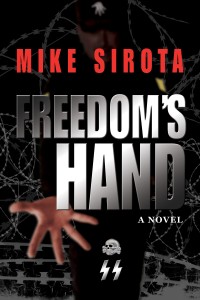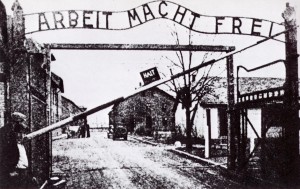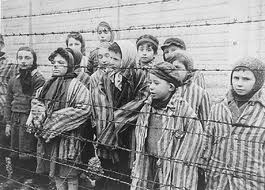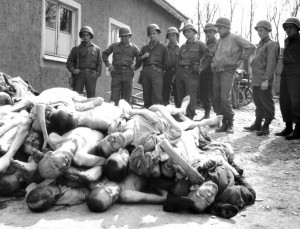Have things changed much since I first presented this post in 2018? If anything, they’ve gotten worse.
 Last week, in a quiet suburb near San Diego, some moronic cretins thought it would be fun to paint a swastika on the home of a Jewish family. On the first night of Chanukah the family decorated the front of their house with a Star of David and dancing dreidels. Their joy was short-lived, the desecration coming within hours.
Last week, in a quiet suburb near San Diego, some moronic cretins thought it would be fun to paint a swastika on the home of a Jewish family. On the first night of Chanukah the family decorated the front of their house with a Star of David and dancing dreidels. Their joy was short-lived, the desecration coming within hours.
Wasn’t it enough that, over seven decades ago, this country and its allies defeated the Nazis, who had murdered in excess of ten million people? Have we not learned anything since that time? Why is this still an issue?
In my novel, Freedom’s Hand, a neo-Nazi band of white supremacists erects a concentration camp on American soil—fifty years after the liberation of the camps in Europe. It is a cautionary story that I hope will never come true. In the Prologue, which takes place in 1943, one of my characters, teenager Nathan Adler, has arrived at Auschwitz in a cattle car, along with his mother and kid sister. While the following scene from the Prologue is fiction, it is a fairly accurate depiction of many real scenes that took place during the Holocaust.
Journey’s end. Most were already rising to their feet and rummaging for belongings on the floor of the car. Nathan gently shook Mama and Miriam as the doors were flung open.
“Heraus! Alles heraus! Los!”
“Schnell, Judische schwein! Mach schnell!”

Auschwitz gate: “Work sets you free.”
The words pierced like the bite of a rabid dog. Soldiers dragged people from the car. Mama and Miriam, now rigidly awake, stood with Nathan, who held tightly to an old suitcase they had managed to fill. Waiting reluctantly, they watched as a dozen men clambered into the car: emaciated things with dark, sunken eyes, dressed in poorly-fitting clothes resembling striped pajamas. Wooden shoes drummed on the floorboards as, under the relentless urging of German overseers, they shoved the confused passengers toward the opening. The Adlers were caught in a wave that carried them to the edge.
“Heraus! Schnell!” The words pummeled the senses. Nathan leaped to the platform. Putting down the suitcase, he turned to assist his mother and sister. When they again stood together, the suitcase—all that had been left of their world—was gone.
Amid the frenetic activity surrounding him, Nathan noticed the station sign over the platform: AUSCHWITZ.
The Adlers were thrust into a ragged column. Up and down the platform, those who had already stood before their captors were being formed into longer, more orderly lines. One consisted of men; a second—smaller—of young women; the third and largest of the elderly, those in poor health…and children. Nathan’s earlier uneasiness now strangled him.
 Bright lights from a nearby arbeitslager lit the road that many followed toward manned watchtowers and high fences strung with barbed wire. The Adlers were confronted by a tall, smiling officer in SS gray. All along he had seemed less cruel than the others. He studied the tall, athletic Nathan carefully, often nodding.
Bright lights from a nearby arbeitslager lit the road that many followed toward manned watchtowers and high fences strung with barbed wire. The Adlers were confronted by a tall, smiling officer in SS gray. All along he had seemed less cruel than the others. He studied the tall, athletic Nathan carefully, often nodding.
“Kraftig,” he said in approval. “Gut, gut.”
Hanna Adler stood stiffly as the officer faced her. Removing a glove, he touched her cheek. The hell of recent days could not diminish her comeliness. He was smiling when he lifted her long, tattered dress, but the smile faded when he saw her left leg, deformed from birth. He tapped the metal brace that had long encased it with his walking stick then turned away disgustedly.
Until then, Nathan had refused to believe that what was happening to others could happen to them. Ignoring the tiny Miriam, who clung to her mother’s dress, the officer motioned for two soldiers. One grabbed Hanna’s arm, hurting her, and dragged her toward the long column of those with no future.
“Mama!” Nathan cried. “No, don’t take her—!”
He had gone only a step when other soldiers grabbed him. At first struggling, he was quickly subdued by a blow from the handle of the officer’s stick on the side of the head. Buckling, he couldn’t focus on Mama or Miriam, now at the end of the column and under the cold eye of a scowling SS woman.

Holocaust victims.
“Miriam!” Hanna screamed. “Nathan, please!”
The girl, torn loose, had fallen. “Mama! Mama!” she sobbed.
“Sei still, Judische hund!” the woman snapped.
Hanna Adler was pulled from the column and forced to her knees. With barbaric cruelty the woman drove a heavy boot into her stomach. Gasping, she doubled over.
Miriam began to crawl, then rose to her feet. Blinded by tears she staggered aimlessly, her arms held out. The soldiers were amused.
“Nathan?” the child cried. “Nathan!”
“Miriam?” Nathan could see her now; Mama, too. “In the name of God—!”
Snarling German shepherd dogs, straining against their leashes, had kept the prisoners moving. As Miriam wandered too near some of them, one creature pulled free. The handler made no attempt to retrieve the dog. Its weight crushed the child before its jaws found her throat. Blood spattered the gray dust as it shook the limp body like a rag doll.
More blows fell on Nathan. They would not think of destroying him; a sturdy prisoner was valuable in an arbeitslager. Unable to will away the darkness, he did not see as two others from their train, under stinging orders, lifted Mama and rejoined the column on its march to oblivion.
